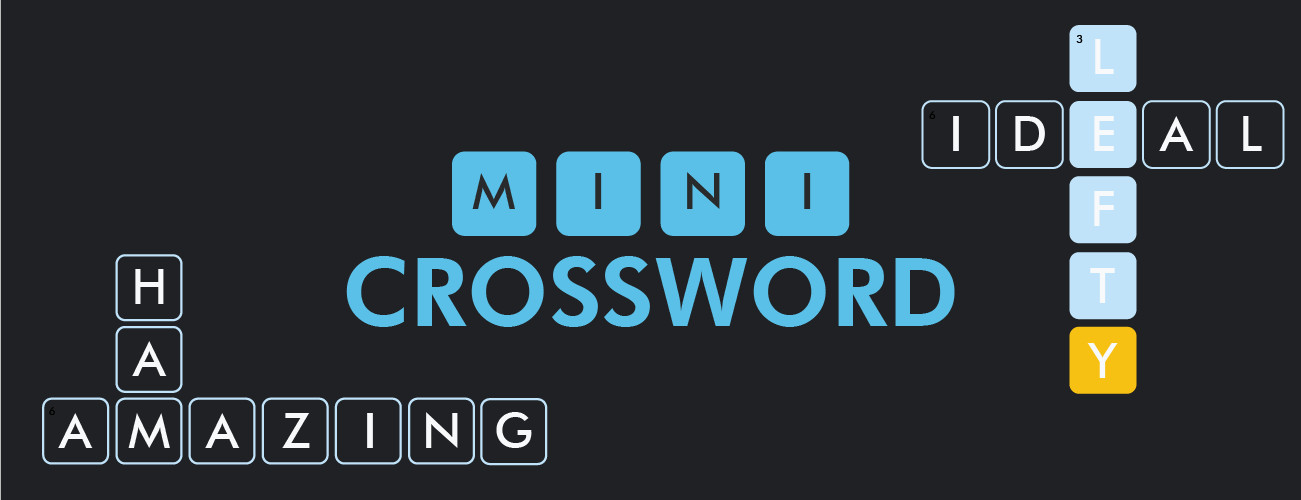Mini crosswords have gained immense popularity in recent years, thanks to their quick and engaging nature. They offer a compact yet challenging puzzle experience that appeals to both seasoned crossword enthusiasts and casual solvers. While mini crosswords are generally simpler than their larger counterparts, understanding the common word patterns in their clues can significantly enhance a solver’s ability to complete them efficiently. This article explores the most prevalent word patterns in mini crossword clues, providing insights, examples, and strategies for effective solving.
Understanding Mini Crosswords
Before delving into the intricacies of word patterns, let’s clarify what mini crosswords are. Mini crosswords typically consist of a 5×5 or 7×7 grid, featuring fewer clues than traditional puzzles. Due to their size, the clues tend to be more straightforward, often relying on common phrases, synonyms, and popular culture references.
Common Types of Clues

To navigate mini crossword puzzles effectively, it’s crucial to recognize the types of clues that frequently appear. Below are the most common types:
- Definitions: Direct synonyms or definitions of a word. Example: “A large body of water” for “OCEAN.”
- Fill-in-the-Blank: Clues that require solvers to complete a phrase. Example: “A ___ in time saves nine” for “STITCH.”
- Abbreviations: Clues that hint at common abbreviations. Example: “U.S. state” for “TX” (Texas).
- Wordplay: Clues that involve puns or clever twists. Example: “Fruit that’s always in trouble” for “BANANA” (a play on the phrase “slipping on a banana peel”).
- Pop Culture References: Clues that reference movies, music, or celebrities. Example: “The ‘King of Pop'” for “MJ” (Michael Jackson).
Commonly Used Word Patterns

Now that we understand the types of clues, let’s examine the specific word patterns that frequently emerge in mini crossword puzzles. Recognizing these patterns can aid solvers in predicting answers and enhancing their crossword-solving skills.
1. Synonyms and Antonyms

Many clues rely on synonyms or antonyms, making them a fundamental pattern in crosswords. These clues often use words that are either direct synonyms or opposites of the answer.
- Example of Synonym: “Quick” for “FAST.”
- Example of Antonym: “Opposite of hard” for “EASY.”
When encountering such clues, think of various words with similar or opposite meanings, which can help you arrive at the correct answer more quickly.
2. Thematic Clues
Many mini crosswords feature a theme that ties together several clues. This could be related to a holiday, a pop culture phenomenon, or a specific category.
- Example: A themed crossword around “Summer” might include clues like “Surfboard holder” for “RACK” or “Popular summer drink” for “LEMONADE.”
Identifying the theme can provide hints for solving other related clues in the puzzle.
3. Number Patterns
Numbers often appear in clues as part of a wordplay or in phrases. Recognizing common number patterns can help solvers deduce answers more rapidly.
- Example: “Five-star rating” could lead to “EXCEL,” and “One who goes to bed early” could refer to “EARLYBIRD.”
Paying attention to how numbers are used in phrases can help in predicting related words.
4. Common Prefixes and Suffixes
Many answers in mini crosswords can be formed using common prefixes and suffixes. Familiarity with these can make it easier to fill in the blanks.
- Common Prefixes: “Un-” (as in “Unhappy” for “SAD”) or “Re-” (as in “Redo” for “AGAIN”).
- Common Suffixes: “-ing” (as in “Running” for “RUN”) or “-er” (as in “Teacher” for “ED”).
Recognizing these patterns can facilitate the solving process, especially when only a few letters are known.
Strategies for Recognizing Patterns
While understanding word patterns is essential, developing strategies for identifying them can further enhance your crossword-solving skills. Here are some effective techniques:
- Practice Regularly: The more you engage with mini crosswords, the more familiar you will become with common patterns and clues.
- Read Widely: Exposure to various texts, including literature, newspapers, and pop culture, increases your vocabulary and knowledge base.
- Join Online Communities: Participate in crossword forums or social media groups to share insights and strategies with fellow enthusiasts.
- Track Your Mistakes: Keep a record of clues you found challenging. Analyzing these can help identify patterns you may have overlooked.
Case Study: Popular Mini Crossword Puzzles
To provide further insights into word patterns, let’s look at a few popular mini crossword puzzles from well-known publications.
- The New York Times Mini Crossword: Known for its clever wordplay and pop culture references, it frequently uses clues that require solvers to think outside the box.
- Los Angeles Times Mini Crossword: This puzzle often features straightforward definitions and synonyms, making it an excellent choice for beginners.
- USA Today Mini Crossword: Known for its contemporary themes, this puzzle frequently incorporates modern slang and references, making it relevant and engaging.
Mastering the common word patterns in mini crossword clues can greatly enhance your solving experience. By recognizing the types of clues, understanding prevalent word patterns, and employing effective strategies, you can approach mini crosswords with confidence. Whether you’re a novice or a seasoned solver, these insights will not only improve your skills but also make the puzzling experience more enjoyable. Remember, the key to becoming a proficient crossword solver lies in practice and familiarity with the language of clues. Happy puzzling!


